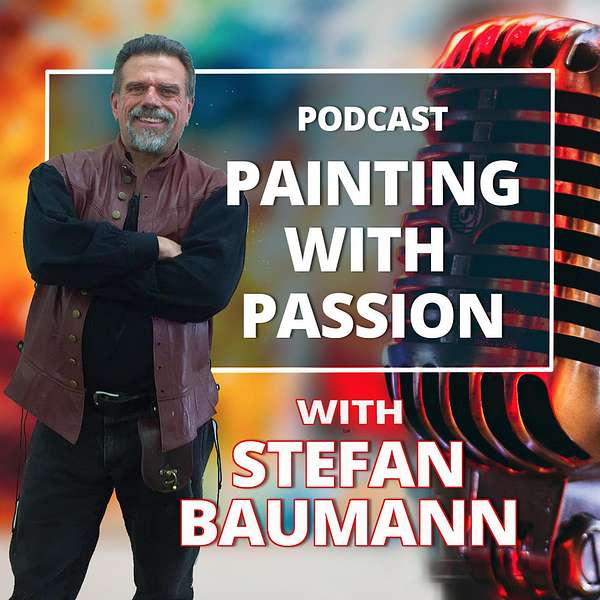
Stefan Baumann Podcast - Inspiration and Insights on Art and Painting
In this episode Stefan Baumann Talks With Patreon Students About nocturne paintings
Why and how to paint a painting in the dark. Also, Stefan Baumann talks about Central Focal Point
Free Book on painting. Click Here for a
Free Book
Available NOW the New Book
Baumann's Ultimate Field Guide to Plein Air Painting
Click Here
If you would love to have an Art Coach : Call Me Stefan-415-606-9074
The Grand View’s coverage of Baumann’s treks encompasses every aspect of the park, focusing on local plants, wildlife, and the geologic and human history that have had an impact on the region. Through the show, Baumann discusses how his art reflects his commitment to ecology and the preservation of the natural environment as he shares his painting techniques with viewers seeking to learn more about the art of painting. With the widespread success of The Grand View, Baumann has captured the hearts and imaginations of a generation by translating his love of nature into luminous paintings with brilliant, saturated colors that transcend conventional landscapes and wildlife art. Currently, the series is airing on CreateTV.
For more information go to www.StefanBaumann.com https://www.stefanbaumann.com/
Stefan Baumann Podcast - Inspiration and Insights on Art and Painting
What's my secret sauce? What's my medium and how do I clean my brushes?
How to Care for Oil Paint Brushes Properly Taking good care of your oil paint brushes is essential to ensure they last a long time and maintain their performance. A common misconception among artists is that washing brushes with water is an effective way to clean them after using oil paints. In reality, water is the worst way to clean your oil paint brushes, and here’s why. When you clean oil paint brushes with water, especially after using turpentine or turpentine substitutes, it causes a chemical reaction that results in a gummy residue forming at the base of the brush hairs. This residue is extremely difficult, if not impossible, to remove and eventually damages the brush by clogging the hairs, affecting flexibility and performance. To preserve your brushes, it is crucial to avoid introducing water until you are completely done with the brushes. Instead, start by cleaning your brushes in turpentine or a turpentine substitute. Turpentine dissolves the oil paint effectively without damaging the brush hairs. Once you have wiped the brush to remove as much paint as possible, the next step is to dip your brushes in clove oil. Clove oil acts as a slow drying retardant, meaning it keeps the brush hairs wet and pliable for a longer period, allowing you to reuse them without the paint drying and hardening on the bristles. This also means that if a little clove oil mixes with your paint during reuse, it will not damage the paint's quality because clove oil eventually dries. Here is a recommended step-by-step process for cleaning and preserving your oil paint brushes: 1. Immediately after painting, clean your brush in turpentine or a turpentine substitute to dissolve the oil paint. 2. Wipe the brush off using a clean rag or paper towel to remove excess solvent and paint. 3. Dip the brush into clove oil and allow it to soak, which will keep the hairs moist and ready for reuse. 4. When you’re ready to paint again, wash the brush thoroughly to remove the clove oil and turpentine so that you start with a clean brush. Maintaining this routine ensures that your brushes never come into contact with water during the cleaning process until you are finished using them for the day. This prevents the formation of gummy residues and greatly extends the lifespan of your brushes, preserving their shape and flexibility through normal wear and tear. This method is especially recommended for all types of brushes, but it is particularly important for high-quality brushes such as those made from squirrel hair or camel hair, which can be delicate and expensive. Proper care using turpentine and clove oil ensures you get the most out of these premium tools. In summary, avoid washing oil paint brushes directly with water, and instead use turpentine for cleaning followed by clove oil for preservation. This approach keeps brushes supple, prevents the buildup of residues, and extends their usability, helping you maintain a professional painting toolkit over many years. For further guidance on painting techniques or brush care, you can visit Stefan Baumann’s website or order his “Ultimate Guide to Plein Air Painting,” which is an cuteness cuteness bye sweetie I love you#artcare, #oilpainting, #brushcare, #artistsupplies, #paintingtips, #oilpaintbrush, #turpentine, #cloveoil, #arttools, #paintingtechniques, #artmaintenance, #brushpreservation, #oilarttips, #paintinghacks, #artisttools, #arttechniques, #brushcleaning, #pleinairpainting, #artstudio, and #creativecare
For more information go to www.StefanBaumann.com https://www.stefanbaumann.com/
Free Book
For painting, coaching call me on my phone at 415-606-9074